Key takeaways:
- Community workshops foster connection and support, allowing participants to share personal stories and build lasting relationships.
- Education in community workshops empowers individuals, helping them acquire knowledge and skills to navigate their circumstances effectively.
- Interactive activities and a comfortable environment are crucial for engaging participants and enhancing their learning experience.
- Measuring the impact of workshops through feedback and follow-up shows real-world changes and reinforces the value of community engagement.
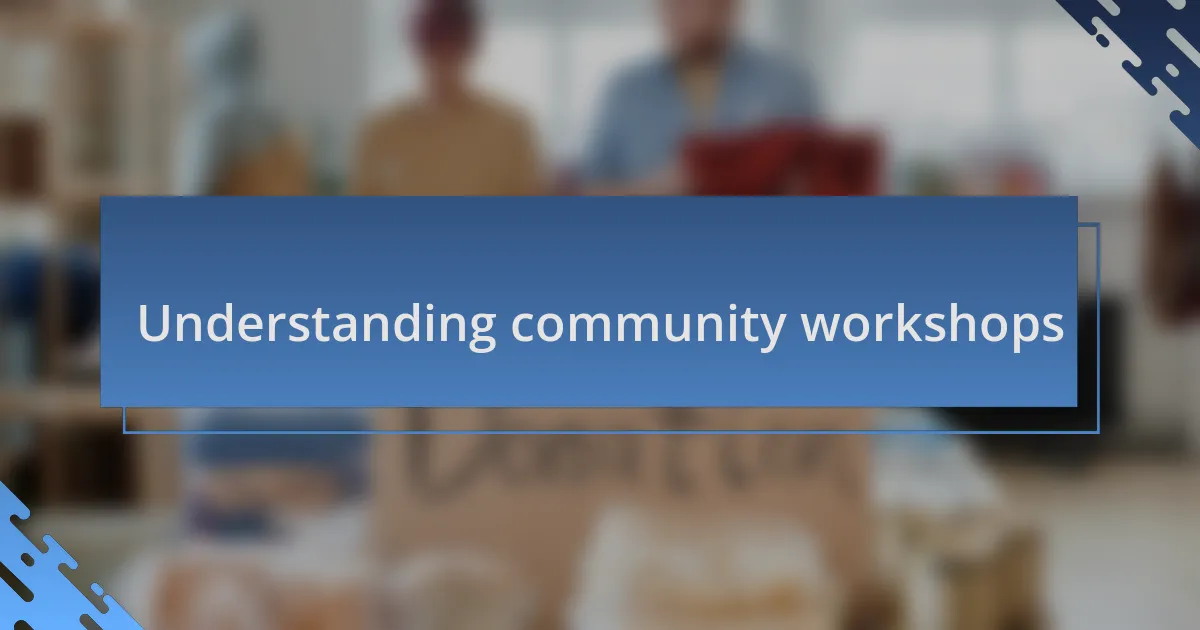
Understanding community workshops
Community workshops offer a unique platform for individuals to come together in shared learning and support. I remember attending my first workshop, feeling a mix of excitement and trepidation. The atmosphere was charged with anticipation, making me realize how important community spaces are for fostering connection among people who might feel isolated by their circumstances.
In these workshops, participants not only gain knowledge but also build relationships that can lead to lasting support networks. One time, I witnessed a participant, who once struggled with expressing himself, blossom as he shared his story. The way the group rallied around him reinforced my belief in the power of community to uplift individuals and create a sense of belonging.
Have you ever felt the impact of a supportive community? That’s precisely what these workshops can ignite—a spark of hope and resilience. They encourage participants to take ownership of their experiences and transform them into collective action, empowering everyone involved to work towards a better future.
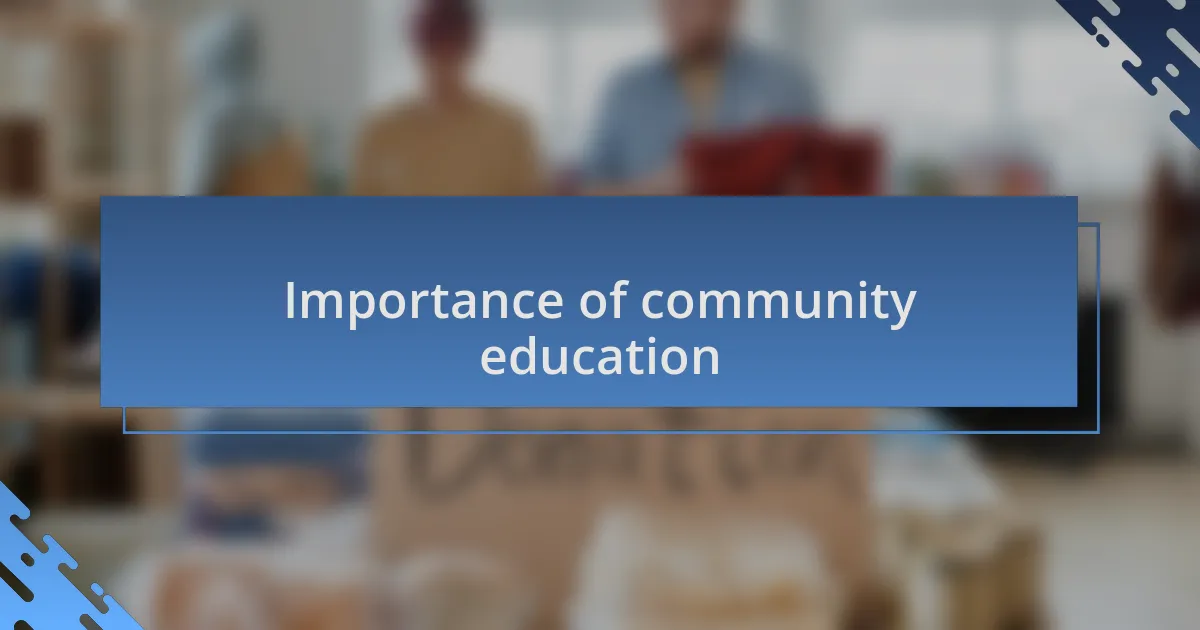
Importance of community education
Community education is crucial in bridging gaps and breaking down barriers. I recall a workshop focused on financial literacy for those experiencing homelessness. Seeing participants’ eyes light up as they grasped budgeting concepts was incredibly rewarding. It struck me how empowering knowledge can be—it equips individuals with the tools to navigate their circumstances more effectively.
Moreover, these educational initiatives foster a sense of agency among participants. At one workshop, a participant shared how understanding health resources in our community helped her advocate for herself. I could sense the pride in her voice, reminding me that education can ignite a fire within individuals, enabling them to take charge of their own lives and decisions.
Have you ever considered how knowledge can transform lives? When communities come together to learn, they not only enhance their own lives but also uplift one another. I’ve witnessed this transformation firsthand, where collective learning creates ripples of positive change that extend beyond the workshop’s walls, fostering a culture of support and resilience.
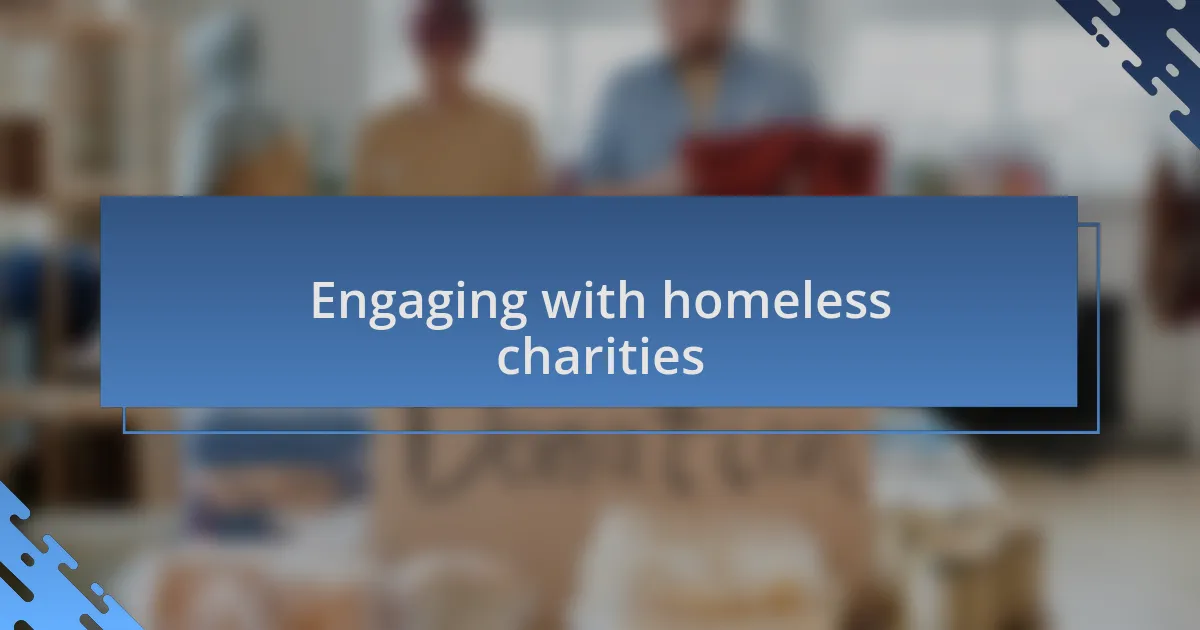
Engaging with homeless charities
Engaging with homeless charities has been one of the most enlightening experiences in my life. I remember my first interaction with a local charity, where I volunteered to help organize a community meal. The sheer gratitude in the eyes of those we served was palpable; it wasn’t just about the food—it was about human connection and understanding. This experience taught me that engagement goes beyond just donating time or resources; it’s about building relationships and fostering trust within the community.
When attending meetings at a local homeless charity, I found it fascinating how each voice was important. I was struck by a conversation about integrating artistic expression into support services. One individual shared how painting helped her cope with her circumstances. It got me thinking: how often do we overlook creative solutions to complex problems? Engagement isn’t merely logistical; it invites us to explore innovative ideas that can touch lives profoundly.
Have you ever felt the impact of a simple conversation? I recall chatting with a participant who opened up about her dreams of starting a small business. My role felt small, yet the hope in her words reminded me of the potential waiting to be unleashed. Engaging with homeless charities isn’t just about giving back; it’s a symbiotic relationship that often leaves you changed for the better.
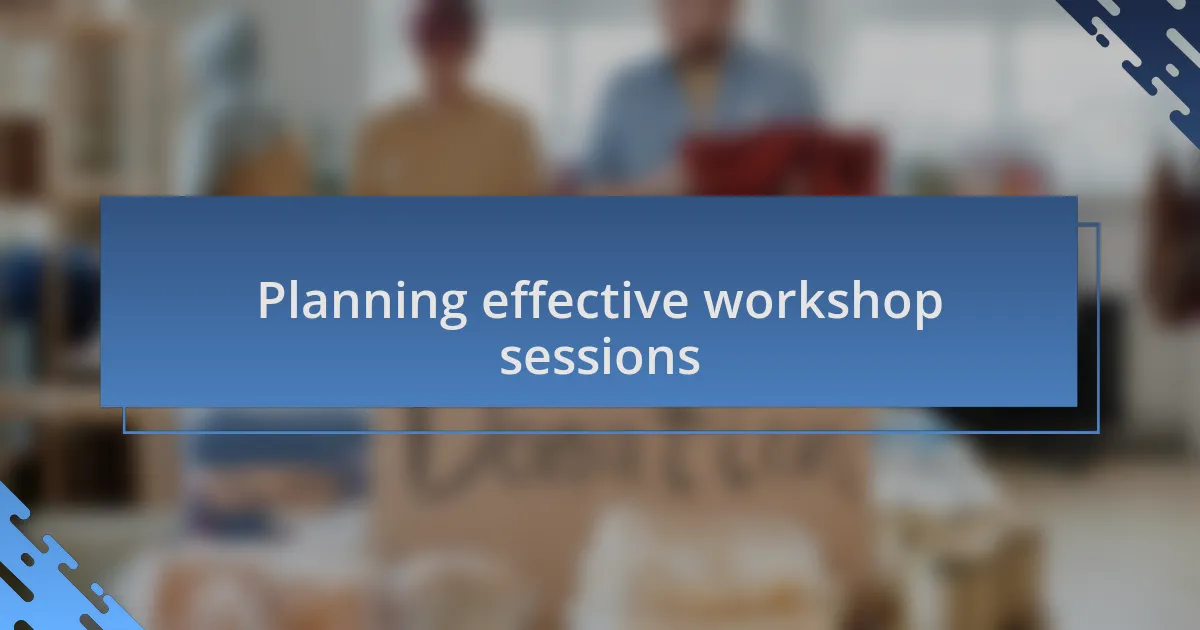
Planning effective workshop sessions
When planning effective workshop sessions, it’s crucial to define clear objectives. I remember leading a workshop on resume writing, where I started by asking participants what they wanted to gain. Their responses shaped the entire session, transforming it from a generic presentation into a tailored experience that kept everyone engaged. This underscores a vital point: when participants feel their needs are acknowledged, they invest more in the process.
Another key element is creating a comfortable environment. I learned this during a mindfulness workshop I facilitated in a community center. One participant shared how nervous they felt at first, but once we initiated some icebreaker activities, the atmosphere shifted entirely. I’ve found that humor and relatability can break down barriers and foster open communication, making participants feel more at ease to share their experiences.
Don’t underestimate the power of interactive activities. I once hosted a budgeting workshop that included a fun, real-life budgeting simulation. Participants had to manage mock incomes and expenses, which led to lively discussions about financial planning. They left not only with new skills but also with genuine connections to each other, making the workshop memorable. Isn’t it remarkable how a simple activity can turn abstract concepts into relatable experiences?
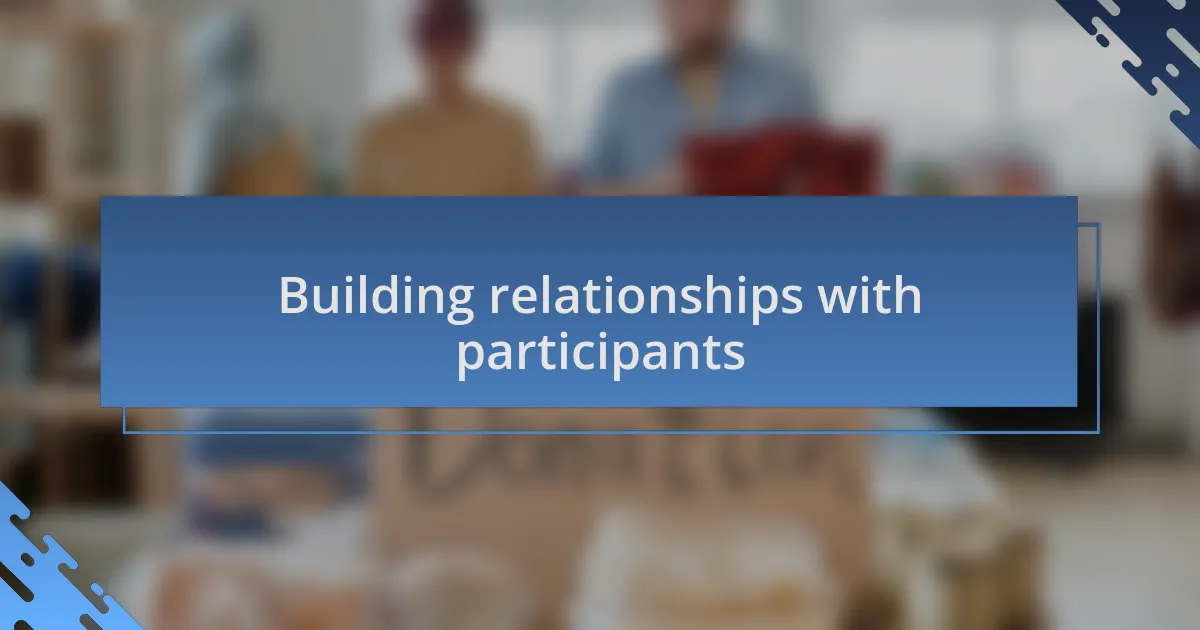
Building relationships with participants
Building strong relationships with participants is essential for effective workshops. I noticed this when I facilitated a culinary workshop focused on healthy cooking. As we chopped vegetables together, participants began to share their personal stories about food and family traditions. It was in those moments that I realized how breaking bread—quite literally—could nurture a sense of community and trust.
Creating an atmosphere where participants feel valued is key. During a workshop on job interview skills, I invited attendees to role-play interview scenarios. Watching them support one another through feedback felt incredibly rewarding. I often ask myself: how can we create a space where everyone feels safe to express themselves? When participants see each other as allies rather than competitors, they become more willing to share their journeys and learn from one another.
I’ve also found that follow-up communication strengthens these relationships tremendously. After a workshop on mental health awareness, I sent each participant a personalized email, thanking them for their contributions and asking about their progress. This simple gesture kept the lines of communication open. Have you ever noticed how a little acknowledgment can make someone feel seen? It’s through these small efforts that we can truly foster lasting connections.

Sharing personal experiences
Sharing personal experiences can be a powerful way to connect with workshop participants. I remember one session where I encouraged everyone to share their personal encounters with homelessness. The vulnerability in the room was palpable; one participant spoke about how a chance encounter with a homeless man changed her perspective on life. Listening to her story made me reflect on the profound impact individual experiences can have on community understanding.
In another workshop, I shared my own story about volunteering at a shelter that changed my life. I spoke about the mix of emotions I felt—frustration, empathy, and ultimately, hope. I posed a question to the group: “What was a moment that changed your view on giving back?” This prompted an inspiring discussion where participants opened up about their own life-changing experiences, creating an intimate space for understanding and connection.
Sometimes, it’s those unexpected moments of sharing that spark true transformation among participants. While leading a discussion on barriers to employment, I recounted a personal setback I faced in my career and how I overcame it. The shifts in body language around the room were striking; suddenly, we were no longer just participants in a workshop, but a group of individuals sharing their journeys. This is when I realized that opening up doesn’t just facilitate dialogue—it cultivates a sense of belonging.
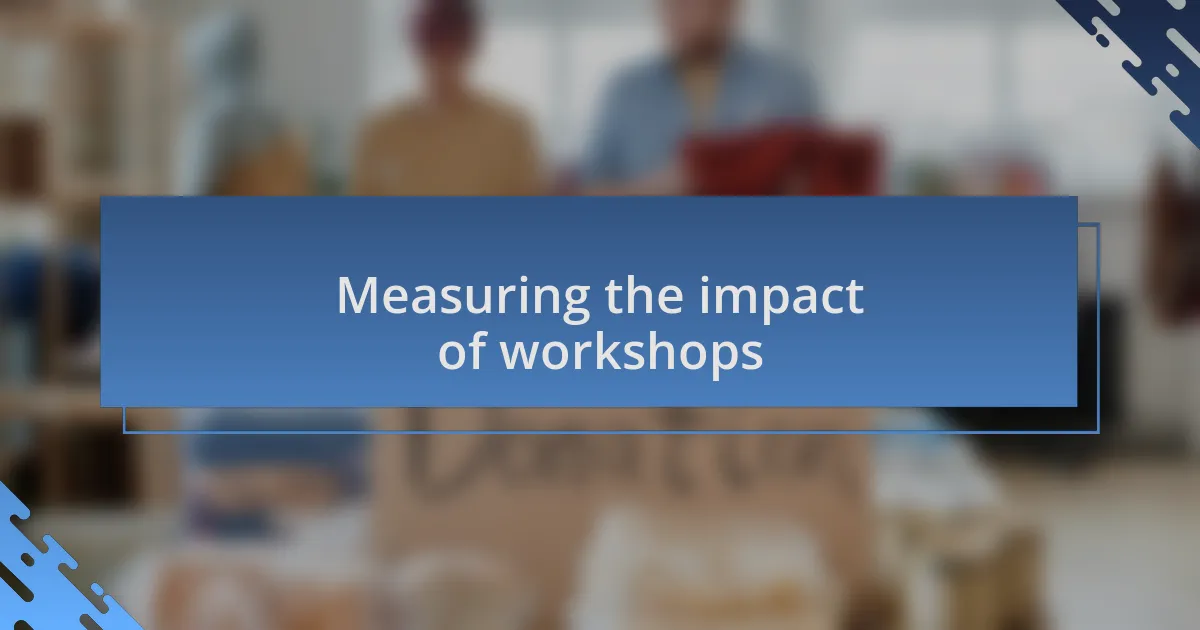
Measuring the impact of workshops
Measuring the impact of workshops is a critical yet often overlooked aspect of community work. I remember implementing feedback forms after each session, asking participants to rate their engagement and learning. It was eye-opening to see the varied responses; some found a sense of empowerment, while others highlighted newfound awareness about homelessness. These insights helped me understand what truly resonated with the group.
I also conducted follow-up interviews a few weeks after workshops, and these conversations were invaluable. Participants shared how the discussions prompted them to take action, whether by volunteering, donating, or simply changing their conversations about homelessness. Hearing stories of tangible changes in behavior reinforced my belief that measuring impact goes beyond numbers; it’s about the real-world outcomes that can uplift the community.
Evaluating the workshops allowed me to refine my approach continuously. I learned that incorporating art and creativity could foster deeper connections among participants. For example, one session led to individuals expressing their thoughts through visual art, which sparked more profound discussions. Isn’t it fascinating how creativity can amplify personal stories? This experience drove home the point that measuring impact is not just about statistical data; it’s about capturing the essence of change in people’s lives.